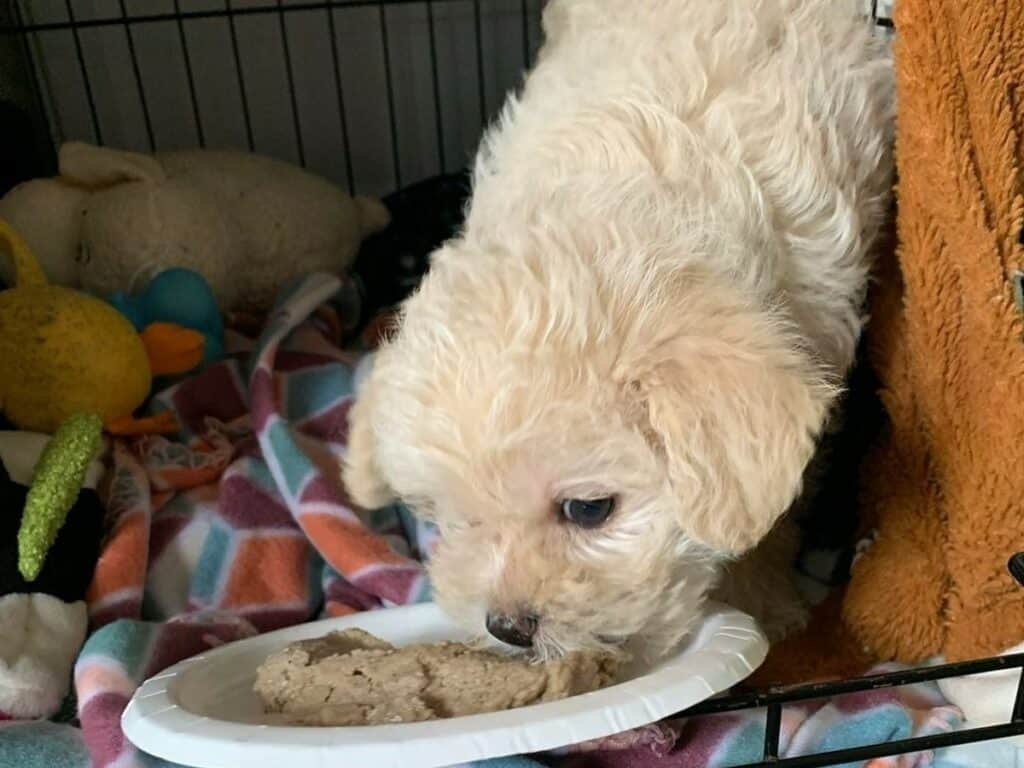Parvo is a nightmare for every fur parent; its aggressiveness presents itself quickly and devastatingly as infected puppies may experience severe vomiting and diarrhea within days of exposure.
Puppies suffering from parvo may not even be able to muster the energy to get up and use the bathroom or hold up their head for more than a few seconds. Though these symptoms can seem like an absolute death sentence for your pet, some signs show that your puppy will survive the ordeal.

What Is Parvovirus?
Parvovirus is a highly contagious virus that affects puppies and young dogs. It’s one of the most contagious and deadly viruses for canines, spreading quickly through both direct and indirect contact with an infected animal or its feces.
What are the stages of parvo? The first stage of parvo begins with flu-like symptoms such as lethargy, loss of appetite, and fever.
If left untreated during this stage, it can quickly progress to the second stage, which may cause vomiting and diarrhea. During this phase, your pup may become increasingly distressed and weak due to its system being overrun by the virus.
The third and final stage of the virus will manifest in severe weakness due to dehydration and electrolyte imbalance caused by extreme fluid losses from vomiting and bloody diarrhea. If left unattended at this point, death is more likely than recovery for the poor pup afflicted with parvo.
Read also: White Specks In Dog Poop? What Should You Do?
What Are The Chances Of My Puppy Getting Better From Parvo?
No puppy parent ever expects their pup to come down with parvo, an infectious and often fatal viral disease that affects puppies in the form of bloody poop and vomiting. But it’s important to recognize the signs of parvo early so you can take immediate action. Studies have shown that the chances of a puppy surviving depend largely on how soon they are diagnosed and treated after initial symptoms present themselves.
In cases when puppies exhibiting first signs of parvo remain untreated, up to 91% will usually die within 2-3 days. If you don’t act fast, your puppy’s chances of getting better from this fatal virus are slim.
If you notice any of the symptoms discussed above in your puppy, you must immediately take them to the vet for an assessment and treatment plan. Don’t wait it out! Delaying a trip to the vet may mean life or death for your little one and should never be taken lightly if you suspect parvo might be present.
The good news is, with the prompt response and appropriate veterinary treatment, there is a 65-93% chance that your pup will survive the virus. For those who have experienced a parvo scare, this statistic brings relief and hope that their beloved furry friend will recover. This statistic is even more encouraging, considering that most puppies who survive parvo’s first and second stages usually recover.
In addition, the chance of a puppy surviving parvo also depends on other factors, such as the time of treatment and type of treatment received.
Time of Treatment: The earlier a puppy is diagnosed with parvo and provided with adequate medical care, the higher its chances of recovery. Timely intervention may also help reduce more serious symptoms in more severe cases.
Type of Treatment: Secondly, determining the best treatment plan can also significantly increase their odds of beating this virus. Depending on the severity of the symptoms, treatments can range from antibiotics to IV fluids.
Read also: How to Cure Parvo Without a Vet: Treat at Home Options
5 Signs That A Puppy Will Survive Parvo
It’s always heartbreaking to see your best friend suffering from an illness like parvo but take heart: when you notice those symptoms start to improve, you know you’ve turned the corner towards good health.
Here are some surefire signs that your puppy has a good chance of making it through its battle with parvo.
1. The Vomiting Stops
All hope is not lost if your pooch starts to feel better and vomits less. As if emerging from a long nightmare, when the vomiting stops it can be an incredible relief for both owner and pet alike. Not only does this mean fewer messes to clean up, but it also indicates that they are on the path to recovery and survival.
2. The Bloody Diarrhea Stops
If a pup has contracted parvo, one of the most well-known signs is persistent bloody diarrhea. Not only will this diarrhea be filled with blood, but it also has an incredibly foul smell.

If you’ve ever asked yourself “How do I know if my puppy will survive parvo?”, we have the answer.
One of the encouraging signs that your puppy may survive this horrible virus is when a puppy stops having bloody diarrhea and begins to pass a firmer and blood-free stool again. This means that their body has fought off the worst, and they are recovering.
3. The Fever Disappears
A high fever is common when puppies have parvo, but once their temperature returns to normal, it indicates that their body is successfully fighting off the virus, and they may just beat it after all.
4. The Appetite Starts To Come Back

A promising sign that your pup is on the mend from parvo is if their appetite returns. When you see your furry friend start to perk up and become interested in eating again, even if it’s in small amounts, things may be looking up. This newfound desire for food can help give strength back to a pup weakened by Parvo and aid them in their recovery.
5. The Energy Increases
If you notice an uptick in activity levels or enthusiasm for food or playtime compared to their pre-parvo state, then that’s a good sign indeed.
Related Questions
Can a puppy contract parvo after its first shot?
Just because your pup has had its first vaccination doesn’t mean they’re invincible. A puppy only becomes fully protected from parvo after receiving the full series of parvo shots.
Are parvo vaccines effective?
Parvo vaccines are incredibly successful in protecting puppies from the deadly virus if given at the appropriate age and intervals.
References
Nandi, S., & Kumar, M. (2010). Canine parvovirus: current perspective. Indian Journal of virology, 21(1), 31-44.
Eregowda, C. G., De, U. K., Singh, M., Prasad, H., Sarma, K., Roychoudhury, P., … & Behera, S. K. (2020). Assessment of certain biomarkers for predicting survival in response to treatment in dogs naturally infected with canine parvovirus. Microbial pathogenesis, 149, 104485.




